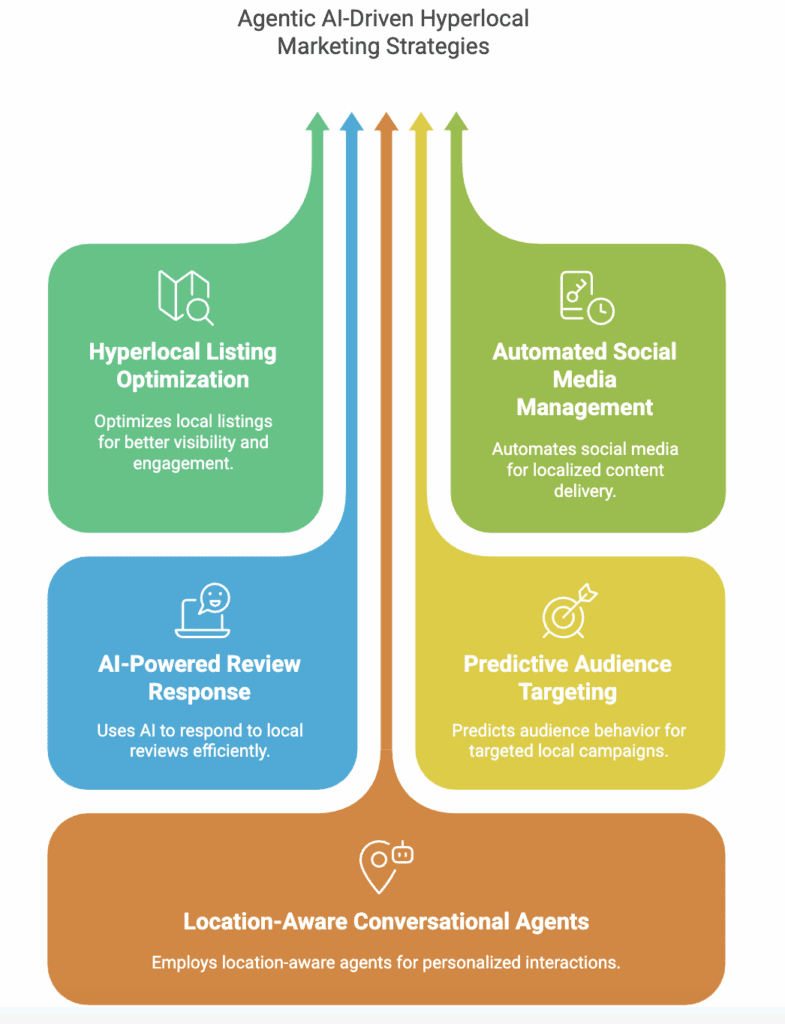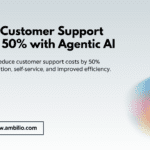In today’s fast-paced digital world, businesses are constantly seeking innovative ways to connect with customers more personally and effectively. One emerging solution that’s making waves in local marketing is the use of AI agents. These intelligent software systems can automate, analyze, and personalize marketing activities—especially useful when targeting customers within a specific geographic area, a practice known as hyper-localized marketing.
Hyper-localized marketing focuses on reaching audiences in small, defined areas—like neighborhoods or even specific streets. AI agents enhance this by bringing real-time automation, decision-making, and scalability to local marketing efforts. Let’s explore the top five use cases where AI agents are transforming hyper-local strategies.
AI Agents in Hyper-Localized Marketing

1. Hyperlocal Listing Optimization
Local search is one of the most powerful tools for small and medium businesses. Whether it’s a coffee shop, gym, or retail store, being visible in “near me” searches is crucial. AI agents can help optimize business listings across platforms like Google Business Profile, Yelp, Apple Maps, and more.
How AI agents help:
- Auto-detect inaccuracies in business information (like store hours or addresses) and correct them.
- Monitor changes in local listings and keep data consistent across multiple platforms.
- Suggest optimization tips like adding photos, responding to FAQs, or updating keywords based on local trends.
By automating these tedious tasks, AI agents ensure that potential customers always see accurate and appealing information, improving both visibility and trust.
2. Automated Localized Social Media Management
Social media is a vital touchpoint for local engagement. However, managing social accounts for multiple locations can be overwhelming. AI agents can handle the heavy lifting by creating and scheduling personalized content that resonates with each local audience.
What they can do:
- Generate posts that include local references, events, or offers.
- Analyze engagement data and suggest better times to post or what content performs well in a specific area.
- Respond to comments and messages in real-time, using pre-trained local language models and tone customization.
For example, a restaurant chain with outlets across cities can deploy AI agents to craft unique posts for each location, taking into account weather, holidays, or local happenings.
3. AI‑Powered Local Review Response
Customer reviews carry enormous influence in buying decisions. Responding quickly and appropriately can boost reputation and build loyalty. But managing this at scale, especially with many locations, is challenging.
AI agents trained in natural language processing can automate responses to customer reviews—tailoring them based on sentiment, location, and even the nature of the comment.
Features include:
- Auto-classifying reviews as positive, neutral, or negative.
- Generating context-aware replies that reflect brand voice and address specific issues raised by customers.
- Escalating critical reviews to human staff when necessary.
This not only saves time but ensures that no feedback is ignored, improving the overall customer experience.
4. Predictive Audience Targeting for Local Campaigns
Understanding local consumer behavior is crucial for delivering relevant ads and promotions. AI agents can analyze hyperlocal data—like foot traffic, weather, local events, and demographics—to predict which audience segments are most likely to convert.
Capabilities include:
- Segmenting audiences by zip code, city, or neighborhood using behavioral and demographic patterns.
- Optimizing ad spends by identifying high-performing micro-locations.
- Personalizing offers that resonate with local values, festivals, or needs.
Imagine a home appliance store launching a cooling system sale just before a heatwave in one city block, while promoting heaters in another—AI agents make this dynamic targeting possible in real-time.
5. Location‑Aware Conversational Agents
Chatbots and virtual assistants have become common on websites and messaging platforms. When made location-aware, these AI agents can significantly improve customer interaction in local marketing.
Example use cases:
- A chatbot on a local retail website can recommend in-stock products at the nearest outlet.
- A hotel’s virtual assistant can suggest nearby tourist spots, restaurants, or events, personalized to a guest’s preferences.
- Service providers like salons or repair shops can use bots to book appointments based on the user’s local branch availability.
By integrating GPS data and user preferences, AI agents can engage users in meaningful ways that increase conversions and loyalty.
Why AI Agents Are a Game-Changer for Local Marketing
Traditionally, hyper-local campaigns required manual effort, local insights, and on-ground presence. With AI agents, businesses can now scale local campaigns intelligently and efficiently. These agents reduce response time, improve accuracy, and create a more personalized experience—factors that are crucial when trying to win over customers in specific communities.
Moreover, AI agents learn and improve over time. As they interact more with customers, they get better at recognizing what works and what doesn’t—continually fine-tuning strategies for better results.
Getting Started
If you’re considering integrating AI agents into your local marketing strategy, here are a few tips:
- Start small with a specific use case like review responses or social media automation.
- Choose platforms that allow easy integration with your CRM, analytics tools, or CMS.
- Monitor performance regularly and fine-tune the agent’s capabilities based on local feedback and behavior.
- Ensure transparency—let users know they’re interacting with AI, and offer easy ways to escalate to human support when needed.
Conclusion
Hyper-localized marketing is all about relevance, timing, and personalization. AI agents help achieve all three—at scale and with precision. Whether you’re managing multiple store locations or looking to build stronger connections within specific communities, integrating AI agents into your strategy can elevate your local presence and drive meaningful engagement.
The future of marketing is not just global or national—it’s deeply local. And with AI agents by your side, you can be present in every neighborhood without being physically there.



